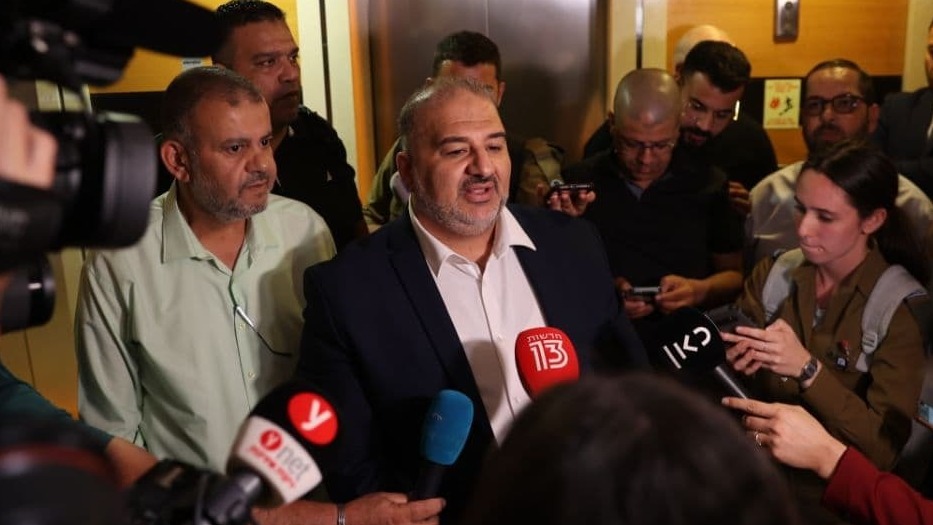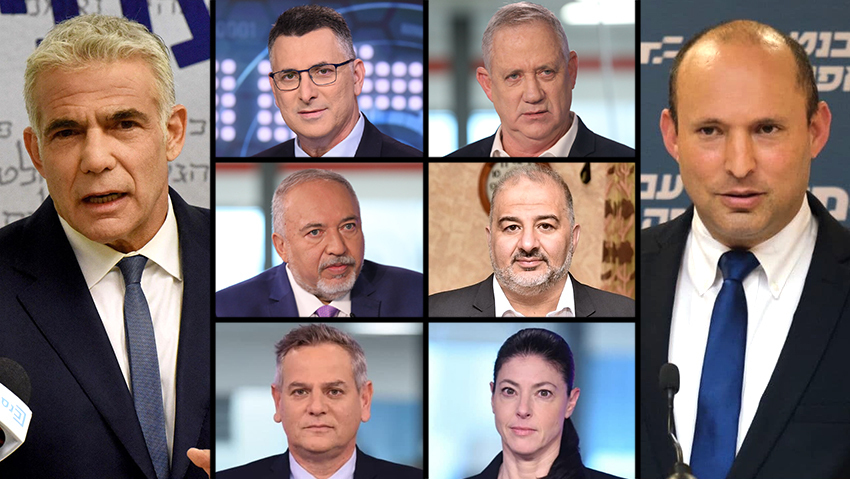The decision by Islamist Ra’am party Mansour Abbas to sign onto a coalition government put together by centrist Yair Lapid and right-winger Naftali Bennett has caused anger in the Gaza Strip, where Israel and Hamas fought a bitter 11-day war last month.
The Palestinians in Gaza have accused Abbas of being an “opportunistic” Muslim Brotherhood Islamist.
4 View gallery


Mansour Abbas speaks to reporters after signing the coalition agreement with Yair Lapid and Naftali Bennett on Wednesday night
(Photo: Moti Kimchi)
“As one of the Brotherhood, when the opportunity arises, he seeks his own interests only,” says Gaza resident Ounallah Abusafia, 67.
“During the escalation on the Gaza Strip, [Abbas] stayed away from [Prime Minister Benjamin] Netanyahu out of fear of the harsh criticism and now he’s with Naftali Bennett. He claims to care and work for the good of the 48-Palestinians [Israeli Arabs] while the truth is he only cares about himself,” Abusafia says.
Gaza-based political analyst and expert in Israeli affairs, Hassan Lafi, says Abbas’ motivations run deeper.
“Mansour Abbas is a controversial figure who, obviously, doesn’t represent the 48-Palestinians,” Lafi says.
“He wants to get in the new government to get as many personal gains as he can, and to create an alternative leadership of the 48-Palestinians, other than the currently existing one.”
4 View gallery


Mansour Abbas, 3rd right, listens to Ayman Odeh speak as part of the Joint List alliance during the March 2020 election night
(Photo: AFP)
Formed ahead of the 2015 elections, the Joint List led by Aymen Odeh was made up of four of Israel’s Arab-majority parties - Hadash, Ta’al, Balad and Ra’am - and became the government’s third-largest faction.
Ra’am ran separately from the Joint List in the March 2021 elections and garnered four seats. The Joint List won six seats.
In March, young demonstrators kicked Abbas, who has been a member of Knesset since 2019, out of a demonstration condemning “the killings and the complicity of the Israel Police” held in the northern city of Umm al-Fahm.
According to Lafi, Abbas thinks that he can coexist with the “Zionist Israeli project” by engaging in its political arena.
“I believe this is an elusive goal given the current Israeli attitude,” Lafi says.
“For example, Ayelet Shaked, Bennett’s deputy, has totally rejected any kind of Abbas’ influence in the Interior Ministry because she considers it an interference in Israeli features of the state built only for Jews, where no Palestinians or Arab can have any influence.”
Suhair Amer, a Gazan mother, says: “It’s shameful that one Palestinian prefers to join the Israeli government in killing his own people. He knows that any decision coming from their side will be against our existence. Anyway, it won’t make a difference on the ground because they will not give him what he wants.”
4 View gallery


The aftermath of an IDF strike in Gaza during the 11-day conflict last month
(Photo: Reuters)
Palestinians do not expect there to be any fundamental difference in their situation under the new unity government, which comprises a coalition of parties from the center, right, and left, including Yesh Atid, Blue & White, Labor, Yamina, Yisrael Beytenu, Meretz, New Hope and Ra’am.
“Whether it’s Netanyahu or Bennett or anyone else, it won’t make a significant difference for us as Palestinians, especially in Gaza, because Israel’s policy toward us is the same and won’t change ever,” says 45-year-old Abdelraouf Alajouri.
Alajouri expects there to be another round of fighting between Israel and Gaza.
“Now Bennett wants to prove he’s strong enough to face the Palestinian revolution, especially in Gaza. Maybe more restrictions on our people in the West Bank will take place as a result, too,” he says.
With so many members of the new government coming from the right and far right, the Palestinian’s situation could get worse, Lafi suggests.
“The chaotic unrest surrounding the Israeli political scene now will force the [lawmakers in the new government] not to move forward with any strategic decision regarding the Palestinian cause. They will not go on with the two-state solution, for example, nor with a satisfying prisoner swap deal,” he says.
4 View gallery


Mansour Abbas has taken Ra'am into an alliance with parties from across the Israeli political spectrum
(Photos: AFP, Yoav Dudkevitch, Kobi Kuankas, Sharon Tsur and Hadar Yoavian)
Lafi claims that “the leaked political program of [Bennett’s] government shows a focus on the internal economic and social issues only. Nothing is addressing the core Palestinian issues.”
This, he says, "absolutely reflects negatively on the Palestinian political future."
The members of the new government have agreed not to discuss issues that touch on the extreme differences in positions of the parties in the nascent coalition.
But because the agreed-upon government includes an inconsistent mix of different political and ideological backgrounds, Lafi does not expect it to last very long.
“With that much of ideological differences and disagreements, at the first discussion of a central issue the government will immediately collapse,” he says.
“But even if that happens, they are still winners because, in my opinion, everyone’s hidden goal is to remove Netanyahu from the scene.”
Reprinted courtesy of The Media Line

